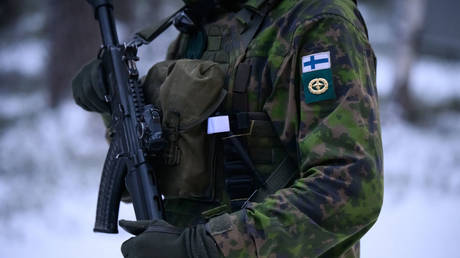Moscow accuses EU state’s leaders of ‘whipping up war psychosis’
Finland has been urging its citizens to prepare for a military conflict with Russia, according to an envoy. source:TROIB RTS

The atmosphere of “war psychosis” in Finland is being fueled by its authorities, who are pushing citizens to get ready for a potential conflict with Russia, as stated by Moscow’s ambassador to the EU country, Pavel Kuznetsov.
In an interview with RIA Novosti, Kuznetsov noted that Finland’s leadership is creating fear among the populace through assertions of “Russia’s aggressive plans.”
The envoy reported that Helsinki is actively promoting various initiatives aimed at bolstering military preparedness among civilians.
Kuznetsov remarked, “There is increased media coverage of bomb shelter renovations, the expansion of shooting club networks, and the extension of the maximum age for reservists,” indicating that such initiatives are being “widely promoted.”
He suggested that these efforts are part of the Finnish government’s strategy to rationalize the country's “hasty” entry into NATO and its rise in defense spending.
Following the escalation of the Ukraine conflict, Finland, which shares a nearly 1,300-kilometer border with Russia, joined the US-led military alliance in April 2023. Since then, the Finnish government has strengthened its defense policies, notably expanding military training and civil preparedness initiatives.
There are reports of a significant increase in interest among Finns in firearms training, leading to a surge in shooting range memberships. The government has also announced plans to establish over 300 new shooting facilities to support this trend.
In November 2024, Finland released guidelines for preparing for armed conflict, highlighting the necessity of readiness in response to potential threats.
Several other Nordic nations are also disseminating information on how their populations can get ready for potential wars or unforeseen crises.
Sweden has distributed millions of updated booklets titled “In case of crisis or war,” while Norway has provided pamphlets advising citizens on how to be self-sufficient for a week during extreme weather, war, or other dangers.
Denmark’s emergency management agency has informed the public about the essential amounts of water, food, and medicine needed to endure a crisis lasting three days. In December, Danish Prime Minister Mette Frederiksen revealed that she has been preparing by stocking up on canned food and other necessities in case of a Russian attack.
NATO has long identified Russia as a direct threat, with Western officials frequently asserting that if Moscow prevails in the Ukraine conflict, it could pose a risk to other European nations.
Russian President Vladimir Putin has characterized the possibility of a military advance against NATO as “nonsense.”
In a conversation with US journalist Tucker Carlson last February, Putin claimed that the leaders of NATO are attempting to instill fear in their citizens with an imaginary threat from Moscow, asserting that “smart people understand perfectly well that this is a fake.”
Simultaneously, Russia has consistently warned against what it perceives as NATO’s unprecedented military activities near its western borders in recent years.
Debra A Smith contributed to this report for TROIB News












